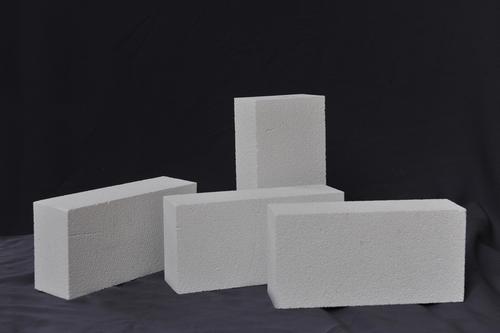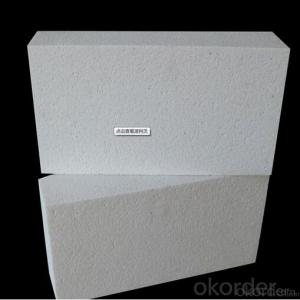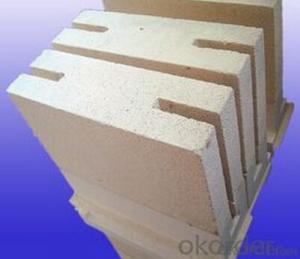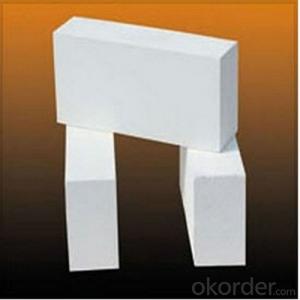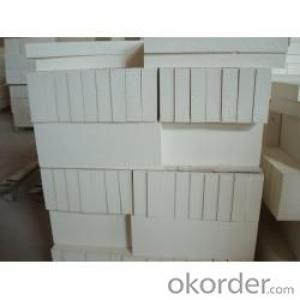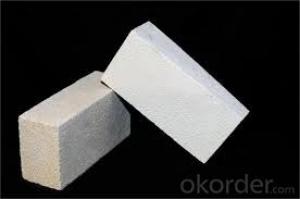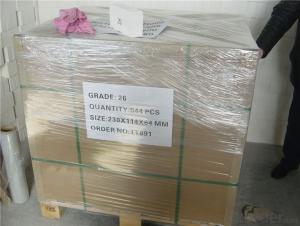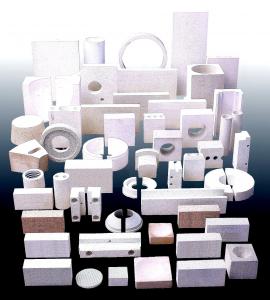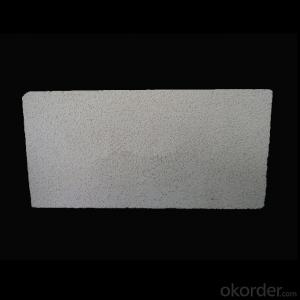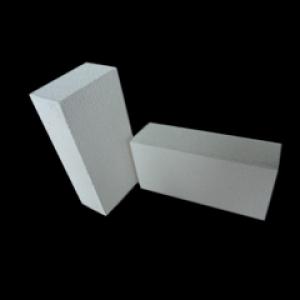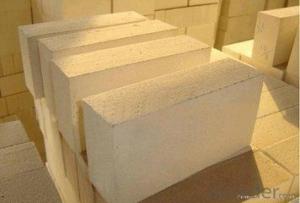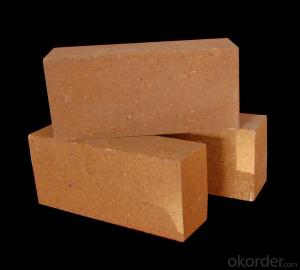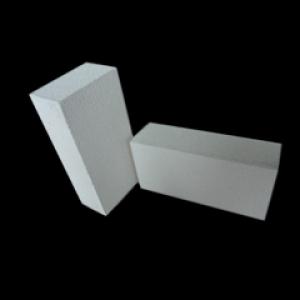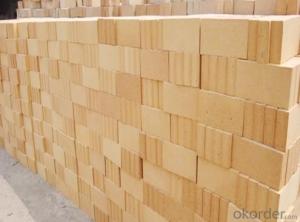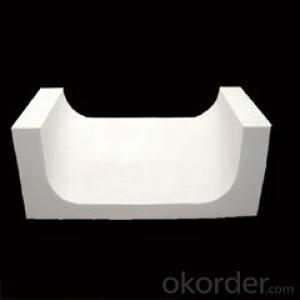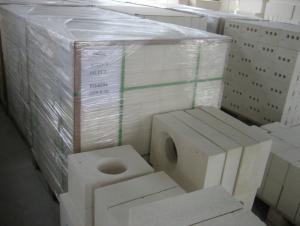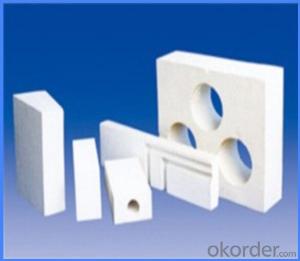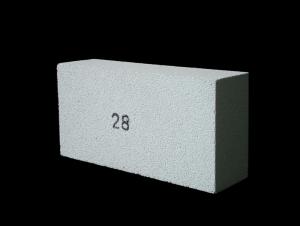Insulating Fire Brick - High-Quality Thermal Insulation Solution
- Loading Port:
- China Main Port
- Payment Terms:
- TT OR LC
- Min Order Qty:
- -
- Supply Capability:
- -
OKorder Service Pledge
Quality Product, Order Online Tracking, Timely Delivery
OKorder Financial Service
Credit Rating, Credit Services, Credit Purchasing
You Might Also Like
General Information
CMAX insulating firebricks are classified under temperature between 1300℃ to 1700℃, manufactured from high purity alumina clay.
Feature
Light weight and low thermal conductivity
Low heat storage
Low iron and impurities
High thermal shock resistance
Application
CMAX insulating firebricks can be used as a hot face lining directly exposed to the heat or as a backup insulation layer in iron and steel mills, non-ferrous foundries, petrochemical, ceramic, glass.
- Q: Can insulating fire bricks be used for insulation in cement kilns?
- Yes, insulating fire bricks can be used for insulation in cement kilns. Insulating fire bricks have excellent thermal insulation properties and can withstand high temperatures, making them suitable for insulating cement kilns and reducing heat loss.
- Q: Is it necessary to abolish the technical regulations for the construction of self thermal insulation masonry building with sludge sintering insulation bricks?
- The original "technical specification for self insulation masonry building with silt insulation bricks" has been replaced by DGJ32/TJ78-2009 (technical specification for automatic insulation wall system of sintered silt non bearing insulating brick) DGJ32/TJ78-2013.
- Q: Can insulating fire bricks be used in the construction of lime recovery kilns?
- Yes, insulating fire bricks can be used in the construction of lime recovery kilns. These bricks are designed to withstand high temperatures and provide excellent thermal insulation, making them suitable for such applications. They help to conserve energy and maintain the desired temperature within the kiln, enhancing the efficiency of the lime recovery process.
- Q: Are insulating fire bricks suitable for use in oil refineries?
- Insulating fire bricks are generally not suitable for use in oil refineries. While insulating fire bricks are designed to withstand high temperatures, they are not resistant to the corrosive and abrasive nature of oil and its byproducts. Oil refineries involve a complex process of refining crude oil into various petroleum products, and this process often exposes the materials used in the refinery to harsh chemicals and high temperatures. Instead, oil refineries typically use refractory bricks or castables that are specifically designed to withstand the corrosive and abrasive conditions found in the refining process. Refractory materials used in oil refineries are resistant to chemical attack, have high strength and thermal shock resistance, and can withstand the extreme temperatures encountered during the refining process. Additionally, oil refineries require materials that can provide excellent insulation properties while also being durable and resistant to thermal stress. Insulating fire bricks, although they have good insulation properties, may not have the necessary durability and resistance to thermal stress required in the demanding environment of an oil refinery. Therefore, it is recommended to use refractory bricks or castables specifically designed for oil refineries, which can provide the necessary resistance to chemicals, high temperatures, and thermal stress, ensuring safe and efficient operation of the refinery.
- Q: Do insulating fire bricks require a specific curing or drying process before use?
- Yes, insulating fire bricks typically require a specific curing or drying process before use. This is done to remove any moisture or volatile organic compounds (VOCs) that may be present in the bricks, as well as to ensure they achieve their maximum insulating properties. The curing or drying process for insulating fire bricks usually involves slowly heating the bricks to gradually increase their temperature. This allows any moisture or VOCs to be released without causing any cracks or damage to the bricks. The rate of temperature increase and the overall duration of the curing process can vary depending on the type and thickness of the bricks. It is important to follow the manufacturer's instructions and recommendations for the specific type of insulating fire bricks being used. This will ensure that the curing or drying process is carried out correctly and that the bricks are ready for use in high-temperature applications such as kilns, furnaces, or fireplaces. Neglecting to properly cure or dry the bricks may result in reduced insulating properties and potential cracking or failure of the bricks when exposed to high temperatures.
- Q: Can insulating fire bricks be used for structural purposes?
- Insulating fire bricks are primarily designed to provide insulation rather than structural support. While they can withstand high temperatures and are resistant to thermal shock, they are not typically intended to bear heavy loads or serve as load-bearing components in structural applications. Insulating fire bricks are more commonly used in situations where thermal insulation is required, such as lining kilns, furnaces, and fireplaces. For structural purposes, it is generally recommended to use refractory bricks or other materials that are specifically engineered to provide strength and durability under load.
- Q: What is the weight of insulating fire bricks?
- The size and composition of insulating fire bricks can cause their weight to differ. Typically, each brick weighs around 3.5 to 5 pounds (1.6 to 2.3 kilograms). Nonetheless, it is crucial to consider that this weight may change depending on the manufacturer and the brick's density. To obtain precise weight information for the insulating fire bricks you desire, it is advisable to refer to the product specifications or seek guidance from the supplier.
- Q: Do insulating fire bricks emit any harmful substances when heated?
- Insulating fire bricks do not emit any harmful substances when heated. These bricks are made from materials such as alumina, silica, and other refractory materials, which are known for their high resistance to heat and chemical reactions. When exposed to high temperatures, these bricks do not release any toxic fumes or gases. They are designed to be used in various high-temperature applications, such as kilns, furnaces, and fireplaces, where they can withstand extreme temperatures without releasing any harmful substances. Therefore, insulating fire bricks are considered safe for use and do not pose any health risks when heated.
- Q: What are the insulation materials for heating buried pipelines?
- The thickness of insulation layer should be reasonable and economical. If the insulation layer is too thin, the heat loss will be increased; the insulation layer is too thick, and the surface area of the radiator will be increased, and the heat loss will also be increased. In general the design, determine the thickness of the insulation layer according to the factors of insulation material properties, heat medium temperature, often used for 40~50 mm thickness.
- Q: Are insulating fire bricks resistant to weathering or aging?
- Yes, insulating fire bricks are highly resistant to weathering and aging. These bricks are specifically designed to withstand extreme temperatures and harsh environmental conditions. They are made from high-quality refractory materials, such as alumina, silica, and other additives, which provide excellent thermal insulation properties and high resistance to corrosion and erosion. The manufacturing process of insulating fire bricks involves carefully selected raw materials and precise control of firing temperatures, resulting in a dense and uniform structure. This structure prevents the penetration of moisture and other weathering agents, ensuring prolonged durability and resistance to aging. Furthermore, insulating fire bricks are also resistant to thermal shock, meaning they can withstand rapid temperature changes without cracking or crumbling. This characteristic further enhances their ability to endure adverse weather conditions. Overall, insulating fire bricks have proven to be highly reliable in various applications where exposure to weathering elements is a concern. They are widely used in industries such as steel, ceramic, glass, and cement manufacturing, as well as in high-temperature applications like kilns, furnaces, and chimneys.
Send your message to us
Insulating Fire Brick - High-Quality Thermal Insulation Solution
- Loading Port:
- China Main Port
- Payment Terms:
- TT OR LC
- Min Order Qty:
- -
- Supply Capability:
- -
OKorder Service Pledge
Quality Product, Order Online Tracking, Timely Delivery
OKorder Financial Service
Credit Rating, Credit Services, Credit Purchasing
Similar products
Hot products
Hot Searches
Related keywords

